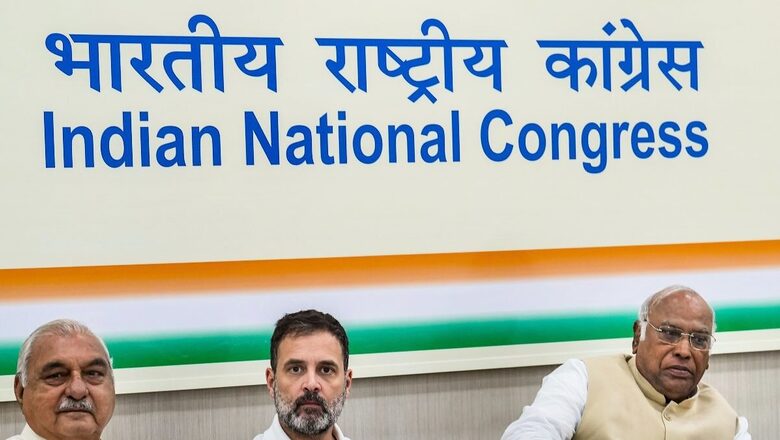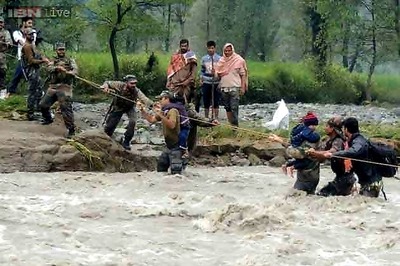
views
The Election Commission of India has announced elections for Jammu & Kashmir and Haryana. While the political dynamics of J&K will naturally differ, the upcoming election in Haryana is set to reveal the true state of the Opposition alliance. Formed before the 2024 Lok Sabha elections, the INDIA bloc was meant to unify the Opposition parties against Prime Minister Narendra Modi and the BJP. However, the Haryana elections will expose the fragility and inconsistency of this alliance.
The INDIA bloc, despite its lofty claims, appears to be held together by a single goal – opposing Narendra Modi. This superficial unity is unravelling as Haryana heads to the polls on October 1. In a state where the BJP’s performance in the 2024 Lok Sabha election was less than stellar, one might expect the Opposition to unite. Yet, the reality is quite the opposite. In Haryana, the Opposition parties are choosing to fight separately, revealing the underlying hypocrisy of their so-called alliance.
This fragmentation is not just a political misstep; it sends confusing signals to the electorate. A divided Opposition not only weakens the anti-BJP front but also sows doubt among voters. The Congress, which made gains in Haryana during this year’s general elections, is going it alone. The Aam Aadmi Party (AAP) has also declared its intention to contest independently. Additionally, the Jannayak Janta Party (JJP), which once aligned with the BJP, has decided to strike out on its own, despite its significant non-Jat support base.
The result? A splintered Opposition that risks dividing the anti-BJP vote, inadvertently aiding the very party they seek to challenge. This raises a crucial question: What message does this send to the people of India? The Opposition, by refusing to collaborate in Haryana, appears to be driven by opportunism rather than a coherent strategy. This opportunistic behaviour not only weakens their position in Haryana but also undermines their credibility on the national stage. In the end, such disunity serves only to bolster the BJP, making it easier for them to capitalise on a fractured Opposition.
A Mirror to the Opposition’s Flawed Strategy
Unlike the Congress, which still maintains a national presence, most other Opposition parties are inherently regional, each vying to expand their influence within specific territories. The JJP, for instance, with its considerable support base, aims to play kingmaker, while the AAP is keen on extending its reach beyond Delhi and Punjab.
This fragmented approach underscores the core issue with the Opposition’s strategy – their unity is more superficial than substantive. If these parties truly wish to present a united front against the ruling BJP, then such opportunistic and hypocritical tactics must be abandoned. The essence of an alliance lies in compromise, in the willingness to prioritise collective goals over individual ambitions.
The BJP-led NDA under Prime Minister Narendra Modi exemplifies this principle. Despite ideological and strategic differences among its partners, the NDA has managed to maintain cohesion, often through compromises that serve the greater good of the alliance. This pragmatic approach has allowed the BJP to hold together a diverse coalition, even when it means making concessions.
The Opposition, if it wishes to pose a credible challenge, must learn from this. The unwillingness to compromise and the reluctance to set aside regional aspirations for a larger national agenda reflects a deeper disunity that voters can easily discern. In politics, as in life, compromise is not just necessary; it is often the key to success. If the Opposition fails to grasp this basic tenet, it risks not only electoral defeat but also the loss of its moral authority.
Congress’ Dilemma in Haryana: Strength and Strife
Haryana, once a stronghold of the Congress under the Hooda family, has seen a resurgence of the party’s fortunes in recent years. Before BJP’s Manohar Lal Khattar became the chief minister in 2014, Haryana was firmly in Congress’ grasp, largely due to the influence of Bhupinder Singh Hooda. Today, Hooda remains the party’s most prominent face in the state, alongside Kumari Selja. The Congress’ vote share in Haryana climbed from 28 per cent in the 2019 Lok Sabha elections to a robust 48 per cent in 2024, a significant gain that also saw the party winning five out of ten Lok Sabha seats, all at the expense of the BJP.
This swing in voter support is a promising sign for the Congress as it heads into the state elections. However, internal divisions within the party threaten to undermine this momentum. The infighting is primarily between the factions led by Bhupinder Singh Hooda and Kumari Selja, both powerful figures in Haryana’s political landscape. The Congress leadership faces a delicate decision – if they choose to bypass Hooda as the chief ministerial candidate, they risk alienating a key leader and his loyal base, especially given that Hooda’s son secured a Lok Sabha seat in 2024.
Moreover, Hooda’s stature as a seasoned and influential politician makes it unlikely that he would easily bow to directives from the Gandhi family, raising further complications. Rumours of strained relations between Hooda and the Gandhi family add another layer of uncertainty. Despite the Congress’ strong position in Haryana, these internal conflicts cast a shadow over their electoral prospects. The challenge for the Congress is not just to capitalise on the BJP’s losses but to navigate its internal power struggles effectively. Without unity and a clear strategy, the party risks squandering the gains it has made.
AAP’s Dilemma in Haryana: Strategic Aspirations and Political Realities
In the 2024 general elections, the Aam Aadmi Party joined forces with the Congress in Haryana, contesting one seat but ultimately losing. This defeat raises crucial questions about the AAP’s future strategy – does the party intend to solidify its role within the broader Opposition alliance, or is it content to chart its own course? The aftermath of the 2024 elections has already seen tensions flare between AAP and the Congress in Delhi, undermining any semblance of a united front.
In Haryana, the AAP has announced that it will go it alone, severing ties with the Congress. The situation is further complicated by the absence of Arvind Kejriwal, who remains in jail over the liquor policy case. Without their charismatic leader, AAP’s campaign in Haryana is struggling to gain traction. While the release of former Delhi deputy chief minister Manish Sisodia has injected some momentum, it’s clear that Sisodia lacks the widespread appeal of Kejriwal. Kejriwal’s wife, Sunita, has stepped in to lead the campaign, but it remains to be seen whether she can effectively helm a full-scale assembly election effort.
Moreover, AAP’s organisational strength in Haryana is minimal, lacking the grassroots presence that is crucial for electoral success. The party’s strategy hinges on attracting disenchanted voters from the Congress and the Jannayak Janta Party, but it’s a risky bet. Historically, the AAP has struggled to dent the BJP’s voter base, which remains steadfast at around 30 per cent in Delhi.
Haryana holds significant strategic value for the AAP. The state lies between Delhi and Punjab, both AAP strongholds, and winning Haryana would create a contiguous belt of AAP-governed states. This could offer the party a unique strategic advantage, solidifying its influence in northern India. However, without a clear strategy and strong leadership, AAP’s ambitions in Haryana might remain unfulfilled, leaving the party to grapple with the political realities of regional competition.
Chautala Legacy: JJP’s Pivotal Role in Haryana’s Political Chessboard
The Chautala family is one of the most prominent and influential political dynasties in Haryana, with a legacy that dates back to the early 20th century. The family’s political journey began with Chaudhary Devi Lal, a towering figure in Haryana’s politics, often referred to as the ‘Champion of Farmers’. Devi Lal played a crucial role in the formation of Haryana as a separate state in 1966 and became the state’s chief minister twice, first from 1977 to 1979 and then from 1987 to 1989. His influence extended beyond Haryana as he also served as the deputy Prime Minister of India under the then PM V.P. Singh.
Devi Lal’s son, Om Prakash Chautala, continued the family’s political legacy. Om Prakash Chautala served as the Chief Minister of Haryana four times between 1989 and 2005. His political career, however, was marred by controversies, including a conviction in a teacher recruitment scam, which led to his imprisonment.
The Chautala family’s political influence was carried forward by Om Prakash Chautala’s sons – Ajay Singh Chautala and Abhay Singh Chautala. However, internal family disputes and political differences led to a split within the family. Ajay Singh’s son, Dushyant Chautala, formed the JJP in 2018 after a rift with his uncle Abhay Singh, who remained with the Indian National Lok Dal (INLD), the original party founded by Devi Lal.
The JJP was born out of this family feud and quickly established itself as a significant political force in Haryana. In the 2019 Haryana Assembly elections, the JJP won 10 seats and became a crucial ally for the BJP, which needed support to form the state government. Dushyant Chautala was subsequently appointed as the Deputy chief minister. However, with time, the alliance between the JJP and the BJP soured, marred by infighting and growing discontent. Eventually, the JJP decided to part ways with the BJP, marking a significant shift in Haryana’s political dynamics.
JJP’s ambitions, however, are not about outright power; they are about strategic influence. The party recognises that it may not have the strength to govern Haryana on its own, but it is keen to play the role of kingmaker once again. This has led to speculation that the JJP might forge an alliance with the Congress, or alternatively, align with whichever party emerges victorious after the elections.
What makes the JJP’s position particularly potent is its substantial non-Jat support base, a demographic that could prove decisive in the upcoming elections. If the JJP chooses to contest independently, it could draw votes away from both the Congress and the AAP, weakening their chances and potentially altering the electoral outcome. The Chautala legacy, though fractured, continues to play a pivotal role in shaping Haryana’s political landscape, with the JJP’s strategic manoeuvres likely to influence the state’s future.
The author, a columnist and research scholar, teaches journalism at St. Xavier’s College (autonomous), Kolkata. His handle on X is @sayantan_gh. Views expressed in the above piece are personal and solely that of the author. They do not necessarily reflect News18’s views.



















Comments
0 comment